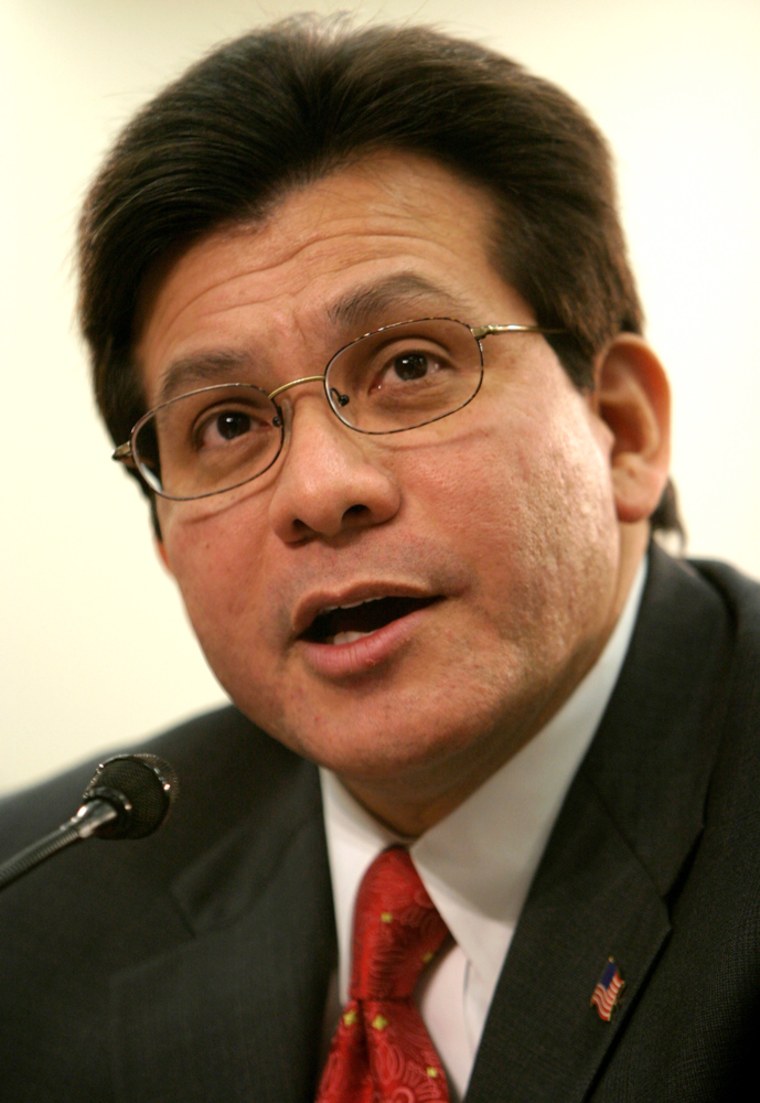Attorney General Alberto Gonzales said Monday that before the United States hands over terrorist suspects to foreign governments, it receives assurances they won’t be tortured. But he acknowledged that once a transfer occurs, the United States has little control.
The Bush administration’s program to send foreigners to other countries — known as “extraordinary rendition” — has been denounced by human rights advocates. They say it amounts to outsourcing torture to elicit information that could not be obtained legally in America.
Gonzales defended the program and reiterated that the Bush administration does not condone torture.
“Our policy is not to render people to countries where we believe or we know that they’re going to be tortured,” he said in an interview with The Associated Press and other news services.
‘We will not torture here’
White House counselor Dan Bartlett offered a similar defense of U.S. policy on Sunday.
“We will not torture here in America and we will not export torture,” Bartlett said on CNN. “That is unacceptable to this president. It’s something that we will not tolerate.”
The attorney general said the State Department and the Central Intelligence Agency obtain assurances that people will be humanely treated. In the case of countries with a history of abusing prisoners, the United States “would, I would think in most cases, look for additional assurances that that conduct won’t be repeated.”
It’s not known how many suspects have been sent to other countries. But at least three people have asserted publicly that the United States shipped them to foreign prisons where they were mistreated and eventually released without being charged with a crime.
One case involved an Egyptian-born Australian who contends he was tortured in an Egyptian prison. A Canadian citizen who was born in Syria says he was abused in Syrian custody. The State Department, in its annual human rights report, last week accused Egypt and Syria of torturing prisoners. The third prisoner, a German man born in Lebanon, alleges he was beaten in an Afghanistan prison.
Gonzales declined to discuss specific cases, but conceded that once a prisoner is in custody elsewhere, “We can’t fully control what that country might do. We obviously expect a country to whom we have rendered a detainee to comply with their representations to us. If you’re asking me, ‘Does a country always comply?’ I don’t have an answer to that.”
Critic finds explanation implausible
Michael Ratner, president of the Center for Constitutional Rights, called Gonzales’ explanation disingenuous at best. He said the Bush administration sends people to particular countries because it intends “abuse and torture to happen when they get turned over.”
In the cases that have come to light, prisoners are asked the same questions they were asked in U.S. custody, Ratner said. “These things are worked together by U.S. intelligence agencies and the intelligence agencies of these countries,” he said.
Gonzales, who previously served as White House counsel, refused to say to what role he played in crafting administration policy on questioning terrorist suspects after the Sept. 11 attacks.
He said the Justice Department would look into any allegations of wrongdoing, but he would not say if any cases were under investigation.
AG defends Padilla's confinement
Gonzales also defended the continued imprisonment of Jose Padilla, a U.S. citizen, as an enemy combatant. Held since May 2002, Padilla has not been charged with a crime, although U.S. officials have said he planned attacks in this country.
A federal judge last week ordered the administration to release Padilla or charge him. Gonzales has said the administration will appeal the ruling.
“This American citizen has had the right of access to our courts to challenge his detention,” Gonzales said.
The administration prevented Padilla from meeting with lawyers for more than 18 months.
